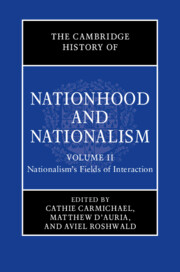Book contents
- The Cambridge History of Nationhood and Nationalism
- The Cambridge History of Nationhood and Nationalism
- The Cambridge History of Nationhood and Nationalism
- Copyright page
- Contents
- Figures
- Tables
- Contributors
- Part I Imperial and Postcolonial Settings
- 1 Building Nation-Empires in the Eighteenth-Century Iberian Atlantic
- 2 Nations and Nationalisms in the Late Ottoman Empire
- 3 The Dutch Empire
- 4 The Habsburg Monarchy
- 5 The British Empire
- 6 The French Empire
- 7 Germany as a “Global Nation,” 1840–1930
- 8 The Russian and Soviet Empire
- 9 The Japanese Empire
- 10 American Internationalism
- 11 The Indian Subcontinent: From Raj to Partition
- 12 Middle Eastern and North African Nationalisms
- 13 African Nationalisms
- 14 Bringing Empires Back in: The Imperial Origins of Nations in Indochina
- Conclusion to Part I
- Part II Transnational and Religious Missions and Identities
- Part III Intersections: National(ist) Synergies and Tensions with Other Social, Economic, Political, and Cultural Categories, Identities, and Practices
- Index
- References
11 - The Indian Subcontinent: From Raj to Partition
from Part I - Imperial and Postcolonial Settings
Published online by Cambridge University Press: 08 November 2023
- The Cambridge History of Nationhood and Nationalism
- The Cambridge History of Nationhood and Nationalism
- The Cambridge History of Nationhood and Nationalism
- Copyright page
- Contents
- Figures
- Tables
- Contributors
- Part I Imperial and Postcolonial Settings
- 1 Building Nation-Empires in the Eighteenth-Century Iberian Atlantic
- 2 Nations and Nationalisms in the Late Ottoman Empire
- 3 The Dutch Empire
- 4 The Habsburg Monarchy
- 5 The British Empire
- 6 The French Empire
- 7 Germany as a “Global Nation,” 1840–1930
- 8 The Russian and Soviet Empire
- 9 The Japanese Empire
- 10 American Internationalism
- 11 The Indian Subcontinent: From Raj to Partition
- 12 Middle Eastern and North African Nationalisms
- 13 African Nationalisms
- 14 Bringing Empires Back in: The Imperial Origins of Nations in Indochina
- Conclusion to Part I
- Part II Transnational and Religious Missions and Identities
- Part III Intersections: National(ist) Synergies and Tensions with Other Social, Economic, Political, and Cultural Categories, Identities, and Practices
- Index
- References
Summary
Gupta’s conviction indicates that Indian nationhood had earlier beginnings than has generally been supposed. The “Mutiny-Rebellion” of 1857, long regarded as a key transformative event, being hailed as the “first war of Indian independence” having “national” elements, was situated within a longer genealogy. This underscored the evolutionary process through which Indian nationhood developed. It also highlighted the multivalence of the revolt. It at once symbolized “power,” Indian agency, and collective identity: cutting across caste, class, and communal divisions. By connecting the revolt with the imperial glory of Mughal Delhi, Gupta mediated the many meanings of 1857, and linked it with a long patriotic past that evoked the idea of India despite endless fragmentation. His remarks hold the key to understanding how the many stories of Indian nationhood converged at complex levels.
Keywords
- Type
- Chapter
- Information
- The Cambridge History of Nationhood and Nationalism , pp. 233 - 256Publisher: Cambridge University PressPrint publication year: 2023

